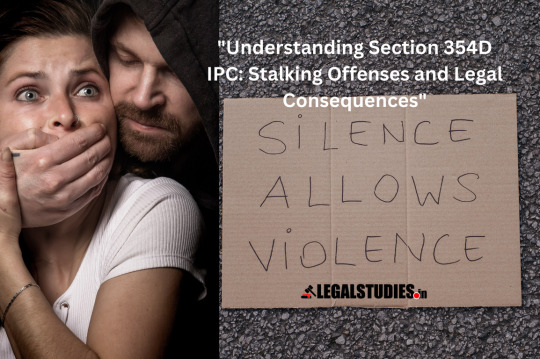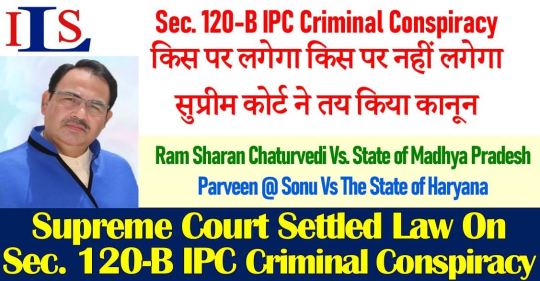#Indian Penal Code
Text
youtube
Theft, Robbery, Extortion, Dacoity under Indian Penal Code, 1860 - Lawxpertsmv India
Visit : https://www.youtube.com/watch?v=yu7SQHJybKQ
Web : https://www.lawxpertsmv.com
Call : +91 6382125862
#Theft Under IPC#Robbery Under IPC#Extortion Under IPC#Dacoity Under IPC#IPC#UPSC#Indian Penal Code#Lawxpertsmv India#Youtube
10 notes
·
View notes
Text
0 notes
Text
Landmark Legislation: Parliament Passes Historic Criminal Law Bills for Overhauling Justice System
Landmark Legislation: Parliament Passes Historic Criminal Law Bills for Overhauling Justice System #CriminalLawReform #ParliamentLegislation #JusticeSystemOverhaul #LegalNews #BharatiyaNyayaSanhita #BharatiyaNagarikSurakshaSanhita #BharatiyaSakshyaSanhita
The Rajya Sabha passed three criminal law bills on Thursday, December 21, 2023, after the Lok Sabha had passed them on Wednesday. The bills are:
Bharatiya Nyaya (Second) Sanhita, which replaces the Indian Penal Code, 1860.
Bharatiya Nagarik Suraksha (Second) Sanhita, which replaces the Code of Criminal Procedure, 1898.
Bharatiya Sakshya (Second) Sanhita, which replaces the Indian Evidence Act,…

View On WordPress
#Bharatiya Nagarik Suraksha Sanhita#Bharatiya Nyaya Sanhita#Bharatiya Sakshya Sanhita#Code of Criminal Procedure#Constitutional Amendments#Criminal Law#Indian Evidence Act#Indian Penal Code#Justice Reform#Legislative Process#Parliament#Sedition#Terrorism
0 notes
Text
India's Legal Labyrinth: A Satirical Guide to Understanding BNS2, BNSS2, and BSB2
**Once Upon a Time in a Legal Wonderland:**In the grand democratic theatre of India, where laws are often more dramatic than Bollywood blockbusters, we’re witnessing the introduction of three legal musketeers: Bharatiya Nyaya (Second) Sanhita (BNS2), Bharatiya Nagrik Suraksha (Second) Sanhita (BNSS2), and Bharatiya Sakshya (Second) Bill (BSB2). They’re set to replace old legal classics – the IPC,…
View On WordPress
#2023#BNS2#BNSS2#BSB2#civil liberties#civil rights#Code of Criminal Procedure#constitutional law#democratic debate#freedom of speech#India legal reforms#Indian Evidence Act#Indian Parliament#Indian Penal Code#judicial system#Khalistan-movement#legal controversies#legal satire#legal updates 2023#Legal-Analysis#legislative process#National-Security#political humor#sedition law#treason in India#witty commentary
0 notes
Text
Murder vs. Culpable Homicide — Understanding the Key Differences
According to Sir William Blackstone, “When a person, of sound memory and discretion, unlawfully kills any reasonable creature in being and under the king’s peace, with malice aforethought, either express or implied.”
When a person deprives someone of his life, he may or may not be liable for murder but in a broader sense, he has committed culpable homicide. So we can say that “All murders are culpable homicides but all culpable homicides are not murders.” In this article, we will discuss the differences between the types of culpable homicides and murder.
Culpable Homicide
The term Homicide, in its broadest sense, is the act of causing the death of another person. It refers to the unlawful killing of a human being, excluding situations where the killing is justified or excused by law. Homicide is a criminal offense that is categorized into different degrees or classifications, such as justifiable homicide, accidental homicide, culpable homicide, and murder depending on the jurisdiction. Culpable homicide is divided into two categories including culpable homicide amounting to murder and culpable homicide not amounting to murder. Section 299 of the Indian Penal Code deals with ‘Culpable Homicide’, it states that “Whoever causes death by doing an act with the intention of causing death, or with the intention of causing such bodily injury as is likely to cause death, or with the knowledge that he is likely by such act to cause death, commits the offence of culpable homicide.”
Murder
Murder is a type of homicide that is defined under Section 300 of the IPC, it states that “Except in the cases hereinafter excepted, culpable homicide is murder, if the act by which the death is caused is done with the intention of causing death, or-
Secondly — If it is done with the intention of causing such bodily injury as the offender knows to be likely to cause the death of the person to whom the harm is caused, or-
Thirdly — If it is done with the intention of causing bodily injury to any person and the bodily injury intended to be inflicted is sufficient in the ordinary course of nature to cause death, or-
Fourthly — If the person committing the act knows that it is so imminently dangerous that it must, in all probability, cause death or such bodily injury as is likely to cause death, and commits such act without any excuse for incurring the risk of causing death or such injury as aforesaid.”
Elements of Murder
The intention of causing death of another person is the primary element of murder.
The intention of causing bodily injury or physical injury that is likely to cause death of another person or result in serious injury to another person.
The same should be done with the knowledge that a particular action would result in the death of another person.
Click Here To Read The Full Article
Also Read:
Capital punishment in IndiaConstitutional validity of Death Penalty or Capital punishment in India
#Legal Definitions#Homicide#Murder#Culpable Homicide#Indian Penal Code#Criminal Law#Elements of Murder#Defenses to Murder#Punishment for Murder#Supreme Court Cases#Law in India#Crime and Punishment#Legal Distinctions
0 notes
Text
Say Goodbye to Penal Interest, Hello to Penal Charges

RBI's Game-Changing Move: Say Goodbye to Penal Interest, Hello to Penal Charges
The Reserve Bank of India (RBI) is shaking up the lending landscape with a significant announcement. Starting January 1, 2024, they're bidding adieu to 'penal interest' and introducing 'penal charges' for loan defaulters. But what does this mean for borrowers and lenders? Let's dive into the details.
The Intent Behind the Change
RBI's primary goal is to foster responsible borrowing practices. The shift from penal interest to penal charges aims to instill credit discipline without turning these charges into an additional source of revenue for lenders. In other words, it's about fairness and accountability.
What's Changing Exactly?
The key change lies in how defaults are penalized. Under the new rules, borrowers who breach the terms of their loan contract will face 'penal charges' instead of 'penal interest.' Significantly, these charges won't be capitalized into the principal amount; they'll be separate and transparent.
Fairness Across the Board
The RBI is leaving no room for discrimination. All charges must be reasonable and consistent, regardless of the type of loan. So, no more unfair treatment of specific borrowers.
Transparency Is Non-Negotiable
Lenders are in the spotlight here. They must clearly disclose these charges in loan agreements, critical fact statements, and on their websites. Transparency is the name of the game.
Who's in Scope?
These rules apply to virtually all financial institutions regulated by the RBI, including commercial banks, cooperative banks, NBFCs, housing finance companies, and various financial institutions. However, they don't cover certain financial products like Credit Cards, External Commercial Borrowings, Trade Credits, and Structured Obligations.
What's Next?
The RBI isn't stopping here. They're keen on gathering feedback from the public on these changes. Stay tuned for draft guidelines soon to ensure your voice is heard in shaping the future of lending practices.
In a nutshell, these RBI changes represent a significant shift in lending practices, aiming to make borrowing more transparent, fair, and accountable for everyone involved.
1 note
·
View note
Text
What Constitutes Criminal Conspiracy? What Is The Punishment? | MaroonPaper
Criminal conspiracy is a complex legal concept that involves agreements between two or more individuals to commit unlawful acts in the future.
0 notes
Video
vimeo
What Happened at Golgotha - Penal Substitutionary Atonement
Jesus absorbed God’s wrath for us.
Among the many other happenings during the most important hours in the history of the world — as the Son of God was crucified outside Jerusalem at a place called Golgotha (Mark 15:22) — this accomplishment is the center and foundation and heart.
Jesus had no sin of his own. It was not his own penalty that he bore, but he was a substitute for others, for those who would be joined to him by faith. This we call penal substitutionary atonement — Jesus reconciled sinners to God by being their substitute punishment. He absorbed in his person God’s righteous wrath against us, because of our sin, that we might be free from sin and its penalty and liberated to enjoy such a person forever.
Sadly, but not surprisingly, this most precious of Christian doctrines is under great assault in many quarters. It’s no new assault, and it doesn’t appear to be going away anytime soon. The wrath of God, and its manifestations in hell and penal substitution, are the revealed truths the natural man seems to find most repulsive (for good reason). Penal substitution is a doctrine conscientious pastors and Christian leaders must stay fresh on and be ready to winsomely answer when the attacks come.
~ Refresh Podcast
0 notes
Text
"Understanding Section 354D IPC: Stalking Offenses and Legal Consequences"
Introduction
Section 354D of the Indian Penal Code (IPC) addresses the issue of stalking, which is a form of harassment that involves persistent and unwanted pursuit of another individual. The provision aims to protect individuals from the distress and fear caused by such behavior. It defines the offense of stalking and outlines the legal consequences for those found guilty of engaging in this…

View On WordPress
#harassment#Indian Penal Code#IPC#legal consequences#Section 354D#stalking laws#stalking modes#stalking offenses
0 notes
Link
Despite the high numbers of reported cases, many cases of child abuse go unreported, and the true extent of the problem is likely to be even greater. The effects of child abuse can be devastating, leading to long-term physical and mental health problems, as well as social and economic consequences. It is essential that the government and civil society organizations work together to prevent child abuse and support victims.
0 notes
Quote
While some laws may have unexpected adverse outcomes, the current Ordinance seems to have targeted harassment and bullying as a primary objective, with astounding scope for abuse. It is to be noted that even prior to the introduction of this Law, there have been widely documented attacks on Christians and Christian institutions which the government has completely and conveniently ignored. Cases have been filed in some of the cases against the Christian groups on charges under the Indian Penal Code sections for promoting enmity between religious groups and outraging religious feelings. There are hardly any cases of conviction under such charges in Karnataka. In the absence of any penalty or oversight of 'false' or fake complaints, and the option now for any third party to complain, one can only imagine how people from the Christian community can be terrorised, coerced and discriminated against under this law. The sweeping generalisations in the law leaves it open for (mis) interpretation and impunity. It also essentially takes away the agency of adults and gives ulterior motives to even actions that haven't occurred. In Karnataka, there is no dearth of tools being brought in to target people from the minority communities. What is glaring is the absence of mechanisms to protect individuals from self-appointed "law enforcement" groups. Laws can become mischievous if there are no strong in-built protective mechanisms to prevent abuse.
Jerald D'Souza, ‘Karnataka Anti-Conversion law: Targeting charitable causes under the pretext of allurement’, News9
#News9#Jerald D'Souza#India#Karnataka#Karnataka Right to Freedom of Religion Ordinance 2021#targeted harassment#bullying#attacks on Christians and Christian institutions#Indian Penal Code#false charges#fake complaints#Christian community#generalisations in the law#minority communities#self-appointed law enforcement groups
1 note
·
View note
Text
The Bazee.com Legal Battle: Intermediary Liability, Online Platforms, and Free Speech
The Bazee.com Controversy: Avnish Bajaj’s Arrest and the Freedom of Online Marketplaces
In the early 2000s, the world witnessed the rapid growth of e-commerce and online marketplaces. One such platform, Bazee.com, later known as eBay.in, became a household name in India. However, the company and its CEO, Avnish Bajaj, found themselves embroiled in a highly controversial legal battle that raised…

View On WordPress
#Avnish Bajaj#Bazee.com#content moderation#E-commerce#eBay.in#Free Speech#India#Indian Penal Code#Information Technology Act#intermediaries#intermediary liability#legal battle#Liability#obscenity#online marketplace#Online Marketplaces#Supreme Court#user-generated listings
1 note
·
View note
Text
SUPREME COURT DECIDES ON SEC. 120-B IPC CRIMINAL CONSPIRACY, CONFESSION OF COACCUSED UNACCEPTABLE,
SUPREME COURT DECIDES ON SEC. 120-B IPC CRIMINAL CONSPIRACY, CONFESSION OF COACCUSED UNACCEPTABLE,
Sec. 120-B IPC एक ऐस��� कानूनी धारा है जो सब आरोपियों को डराती है। वह प्रेम असफलता के केस हों, रुपये पैसे के केस हो, मर्डर हो, चीटिंग हो, रेप हो कोई भी अपराध पुलिस ने दर्ज किया हो तो वह धड़ल्ले से Sec. 120-B IPC का इस्तेमाल करती है। दो आरोपी किसी भी अपराध में शामिल हों तो पुलिस साथ ही यह आरोप भी लगा देती है कि उन आरोपियों ने मर्डर करने से पहले मर्डर करने की साजिश की थी और उसके बाद अपराध को अंजाम…

View On WordPress
#accused#Against False Allegation#Against false Cases#Circumstantial Evidence#Code Of Criminal Procedure#Confession#Court#Criminal Conspiracy#Cross Examination#Defence Counsel#Direct Evidence#Evidence Act#False Allegation#False Rape Allegation#False Rape Case#Indian Legal System#Indian Penal Code#Justice B.R. Gavai#Justice Hrishikesh Roy#Justice PS Narasimha#Justice R Subhash Reddy#Meeting of Minds#Onus of Proof#Parveen @ Sonu Vs The State of Haryana#Prosecutrix#Ram Sharan Chaturvedi Vs. State of Madhya Pradesh#Sec. 120-A IPC#Sec. 120-B IPC#State of Kerala v. P. Sugathan#Substantial Evidence
0 notes
Text
Indian Penal Code in Telugu
IPC in TELUGU
View On WordPress
0 notes
Link
Chapter IV of IPC dealing with the general exceptions (part II) is discussed with the help of relevant cases.
0 notes